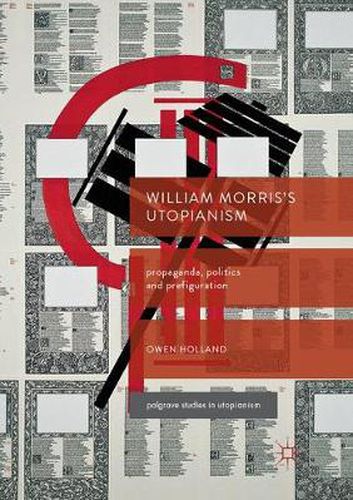Readings Newsletter
Become a Readings Member to make your shopping experience even easier.
Sign in or sign up for free!
You’re not far away from qualifying for FREE standard shipping within Australia
You’ve qualified for FREE standard shipping within Australia
The cart is loading…






This title is printed to order. This book may have been self-published. If so, we cannot guarantee the quality of the content. In the main most books will have gone through the editing process however some may not. We therefore suggest that you be aware of this before ordering this book. If in doubt check either the author or publisher’s details as we are unable to accept any returns unless they are faulty. Please contact us if you have any questions.
This book offers a new interpretation of William Morris’s utopianism as a strategic extension of his political writing. Morris’s utopian writing, alongside his journalism and public lectures, constituted part of a sustained counter-hegemonic project that intervened both into the life-world of the fin de siecle socialist movement, as well as the dominant literary cultures of his day. Owen Holland demonstrates this by placing Morris in conversation with writers of first-wave feminism, nineteenth-century pastoralists, as well as the romance revivalists and imperialists of the 1880s. In doing so, he revises E.P. Thompson’s and Miguel Abensour’s argument that Morris’s utopian writing should be conceived as anti-political and heuristic, concerned with the pedagogic education of desire, rather than with the more mundane work of propaganda. He shows how Morris’s utopianism emerged against the grain of the now-here, embroiled in instrumental, propagandistic polemic, complicating Thompson’s and Abensour’s view of its anti-political character.
$9.00 standard shipping within Australia
FREE standard shipping within Australia for orders over $100.00
Express & International shipping calculated at checkout
This title is printed to order. This book may have been self-published. If so, we cannot guarantee the quality of the content. In the main most books will have gone through the editing process however some may not. We therefore suggest that you be aware of this before ordering this book. If in doubt check either the author or publisher’s details as we are unable to accept any returns unless they are faulty. Please contact us if you have any questions.
This book offers a new interpretation of William Morris’s utopianism as a strategic extension of his political writing. Morris’s utopian writing, alongside his journalism and public lectures, constituted part of a sustained counter-hegemonic project that intervened both into the life-world of the fin de siecle socialist movement, as well as the dominant literary cultures of his day. Owen Holland demonstrates this by placing Morris in conversation with writers of first-wave feminism, nineteenth-century pastoralists, as well as the romance revivalists and imperialists of the 1880s. In doing so, he revises E.P. Thompson’s and Miguel Abensour’s argument that Morris’s utopian writing should be conceived as anti-political and heuristic, concerned with the pedagogic education of desire, rather than with the more mundane work of propaganda. He shows how Morris’s utopianism emerged against the grain of the now-here, embroiled in instrumental, propagandistic polemic, complicating Thompson’s and Abensour’s view of its anti-political character.